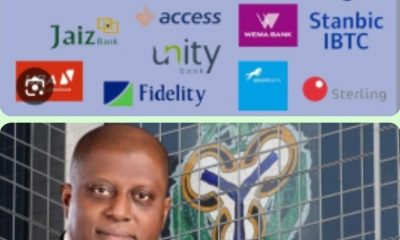Business
Pace setting Fidelity Bank MD, Nneka Onyeali-Ikpe clocks 60

Pace setting Fidelity Bank MD, Nneka Onyeali-Ikpe clocks 60
There is tremendous excitement in the air as the first female Managing Director and Chief Executive Officer of Fidelity Bank Plc, Dr. Nneka Onyeali-Ikpe clocked 60 years on Sunday July 28, given her outstanding performance in the nation’s financial services sector that had earned her respect amongst banks’ top CEOs.
Besides leading the bank to close the 2023 financial year with strong double-digit growth across key income and balance-sheet lines with profit before tax growing by 131.5% to N124.3bn from N53.7bn in 2022FY, leading to an increase in Return on Average Equity (RoAE) of 26.5% from 15.6% in 2022FY, her proactive efforts also manifested when the bank opened its N127.10bn rights issue and public offer in June, becoming the first bank to go public following the recapitalisation directive of the Central Bank of Nigeria issued in March.
This wasn’t surprising to many industry watchers, as the virtuous woman and Champion Newspapers’ 2022 Banker of the Year, has consistently advocated that “women must work hard, invest in their personal development, constantly up-skill and gain deep knowledge of their industry, for them to break the ice in their careers” adding however that it is “extremely important that we create enabling environments for women to thrive and maximise their full potential.
At the public offer and rights issue facts behind the combined offer presentation at the Nigerian Exchange Limited, she explained that the financial institution’s N127.10bn capital raising was to be considered as a pacesetter in the life of the banking industry capitalisation drive, revealing that Fidelity Bank has already started the process of raising additional capital ahead of CBN’s directive, “requiring the banks to raise a minimum capital base of N200bn for national banks and N500bn for banks with international operations like ours, amongst other capital requirements”.
Though the full report on the outcome of the bank’s public offer of 10 billion ordinary shares of 50 kobo each at N9.75 per share and rights issue of 3.2 billion ordinary shares of 50 kobo each at N9.25 per share has not been fully made public, industry experts earlier predicted a highly successful exercise given the financial institution’s recent strong financial performance and with a client base of over 8 million customers.
Born in Anambra state on July 28, 1964, Nneka joined Fidelity Bank as an Executive Director in 2015 and was appointed Managing Director/CEO of the Bank in January 2021.
According to her citation, she is an alumnus of the prestigious University of Nigeria, Nsukka and Kings College, London where she holds a Bachelor of Law and Masters of Law respectively and has also attended executive training programs at Harvard Business School, The Wharton School University of Pennsylvania, INSEAD School of Business, Chicago Booth School of Business, London Business School and IMD amongst others.
And with over 33 years of experience in investment banking, wealth management, Treasury Management, retail banking and corporate banking among others, Nneka is widely regarded as one of Africa’s leading CEOs with a reputation for “identifying talents, opportunities and executing complex business deals”.
For instance under her leadership, Fidelity Bank has been adjudged by many industry leading experts as the fastest growing bank in Nigeria while her deep understanding of complex businesses and markets has enabled the bank undertake large ticket transactions in financial advisory, structured and project finance in the real sectors as well as take advantage of opportunities in select high growth international markets where the Bank has a competitive advantage.
Significantly, she guided the bank to obtain the approval of the Central Bank of Nigeria, CBN, to expand its operations to the United Kingdom that culminated in Fidelity Bank’s acquisition of the 100 per cent equity in Union Bank UK, a subsidiary of the Union Bank of Nigeria.
Very passionate about innovation and embracing technology, Nneka towering achievements include her pioneering role in several innovative and pacesetting products such as the PayGate Plus, an online platform that enables businesses make and receive payments.
Married to Dr. Ken Onyeali-Ikpe, the workaholic has also radically repositioned the bank as the “go-to financial institution for Small and Medium Enterprises”.
Furthermore, apparently understanding the critical role of small businesses in the sustenance of economic growth and development, she led the bank to create the Fidelity International Trade & Creative Connect (FITCC) which is aimed at providing a touchpoint for exporters, regulators, subject matter experts and the market.
According to the records, the FITCC 2022 edition was attended by representatives of both the UK & the Nigerian Governments, Nigerian exporters, investors, regulators from the United Kingdom and Nigeria, the business community and other practitioners. The pipeline deals from the event was in excess of $200million. Also, over 2,000 people registered to attend the event and daily foot-fall was about 1,000.
Similarly, recall that second edition of the FITCC, held in Houston, Texas in the United States of America took place from the 24th to 25th of October, 2023 at the plush George R. Brown Convention Center, 1001 Avenida de las Americas. It was well attended too.
But in her bid to give back to the communities the Bank serves and as part of her efforts to combat the twin issues of poverty and hunger, Mrs Onyeali-Ikpe launched a National Corporate Social Responsibility initiative tagged The Fidelity Food Bank which provides free food bags to people across Nigeria on a monthly basis.
A winner of several international and national awards including Officer of the Order of the Niger, OON, Nneka has been recognized by several local and international bodies for her giant strides and such high profile recognitions include: “The Banker of the Year 2022 at the 14th Leadership Annual Conference and Awards; The Best Banking CEO Nigeria 2023 in the 2023 Global Banking & Finance Awards as well as Champion Newspapers’ 2022 Banker of the Year.
No doubt her impactful leadership and outstanding performance as CEO, had resulted in the bank bagging several laurels within and outside Nigeria some of which are: “Best Commercial Banking Brand in Nigeria by the Global Brands Magazine Awards; Best Private Bank in Nigeria by The Financial Times in association with The Banker Magazine; Global Finance’s World’s Best Private Banks 2023 awards for Best Private Bank in Nigeria and The Best Payment Solution Provider Nigeria 2023 in the 2023 Global Banking & Finance Awards amongst others.
Happy birthday to a pacesetter and accomplished banker.
Culled from Champion Newspaper Website
Business
Nigeria’s Inflation Drops to 15.10% as NBS Reports Deflationary Trend

Nigeria’s headline inflation rate declined to 15.10 per cent in January 2026, marking a significant drop from 27.61 per cent recorded in January 2025, according to the latest Consumer Price Index (CPI) report released by the National Bureau of Statistics.
The report also showed that month-on-month inflation recorded a deflationary trend of –2.88 per cent, representing a 3.42 percentage-point decrease compared to December 2025. Analysts say the development signals easing price pressures across key sectors of the economy.
Food inflation stood at 8.89 per cent year-on-year, down from 29.63 per cent in January 2025. On a month-on-month basis, food prices declined by 6.02 per cent, reflecting lower costs in several staple commodities.
The data suggests a sustained downward trajectory in inflation over the past 12 months, pointing to improving macroeconomic stability.
The administration of President Bola Ahmed Tinubu has consistently attributed recent economic adjustments to ongoing fiscal and monetary reforms aimed at stabilising prices, boosting agricultural output, and strengthening domestic supply chains.
Economic analysts note that while the latest figures indicate progress, sustaining the downward trend will depend on continued policy discipline, exchange rate stability, and improvements in food production and distribution.
The January report provides one of the clearest indications yet that inflationary pressures, which surged in early 2025, may be moderating.
Bank
Alpha Morgan to Host 19th Economic Review Webinar

Alpha Morgan to Host 19th Economic Review Webinar
In an economy shaped by constant shifts, the edge often belongs to those with the right information.
On Wednesday, February 25, 2026, Alpha Morgan Bank will host the 19th edition of its Economic Review Webinar, a high-level thought leadership session designed to equip businesses, investors, and individuals with timely financial and economic insight.
The session, which will hold live on Zoom at 10:00am WAT and will feature economist Bismarck Rewane, who will examine the key signals influencing Nigeria’s economic direction in 2026, including policy trends, market movements, and global developments shaping the local landscape.
With a consistent track record of delivering clarity in uncertain times, the Alpha Morgan Economic Review continues to provide practical context for decision-making in a dynamic environment.
Registration for the 19th Alpha Morgan Economic Review is free and can be completed via https://bit.ly/registeramerseries19
It is a bi-monthly platform that is open to the public and is held virtually.
Visit www.alphamorganbank to know more.
Business
GTBank Launches Quick Airtime Loan at 2.95%

GTBank Launches Quick Airtime Loan at 2.95%
Guaranty Trust Bank Ltd (GTBank), the flagship banking franchise of GTCO Plc, Africa’s leading financial services group, today announced the launch of Quick Airtime Loan, an innovative digital solution that gives customers instant access to airtime when they run out of call credit and have limited funds in their bank accounts, ensuring customers can stay connected when it matters most.
In today’s always-on world, running out of airtime is more than a minor inconvenience. It can mean missed opportunities, disrupted plans, and lost connections, often at the very moment when funds are tight, and options are limited. Quick Airtime Loan was created to solve this problem, offering customers instant access to airtime on credit, directly from their bank. With Quick Airtime Loan, eligible GTBank customers can access from ₦100 and up to ₦10,000 by dialing *737*90#. Available across all major mobile networks in Nigeria, the service will soon expand to include data loans, further strengthening its proposition as a reliable on-demand platform.
For years, the airtime credit market has been dominated by Telcos, where charges for this service are at 15%. GTBank is now changing the narrative by offering a customer-centric, bank-led digital alternative priced at 2.95%. Built on transparency, convenience and affordability, Quick Airtime Loan has the potential to broaden access to airtime, deliver meaningful cost savings for millions of Nigerians, and redefine how financial services show up in everyday life, not just in banking moments.
Commenting on the product launch, Miriam Olusanya, Managing Director of Guaranty Trust Bank Ltd, said: “Quick Airtime Loan reflects GTBank’s continued focus on delivering digital solutions that are relevant, accessible, and built around real customer needs. The solution underscores the power of a connected financial ecosystem, combining GTBank’s digital reach and lending expertise with the capabilities of HabariPay to deliver a smooth, end-to-end experience. By leveraging unique strengths across the Group, we are able to accelerate innovation, strengthen execution, and deliver a more integrated customer experience across all our service channels.”
Importantly, Quick Airtime Loan highlights GTCO’s evolution as a fully diversified financial services group. Leveraging HabariPay’s Squad, the solution reinforces the Group’s ecosystem proposition by bringing together banking, payment technology, and digital channels to deliver intuitive, one-stop experiences for customers.
With this new product launch, Guaranty Trust Bank is extending its legacy of pioneering digital-first solutions that have redefined customer access to financial services across the industry, building on the proven strength of its widely adopted QuickCredit offering and the convenience of the Bank’s iconic *737# USSD Banking platform.
About Guaranty Trust Bank
Guaranty Trust Bank (GTBank) is the flagship banking franchise of GTCO Plc, a leading financial services group with a strong presence across Africa and the United Kingdom. The Bank is widely recognized for its leadership in digital banking, customer experience, and innovative financial solutions that deliver value to individuals, businesses, and communities.
About HabariPay
HabariPay is the payments fintech subsidiary of GTCO Plc, focused on enabling fast, secure, and accessible digital payments for individuals and businesses. By integrating payments and digital technology, HabariPay supports innovative services that make everyday financial interactions simpler and more seamless.
Enquiries:
GTCO
Group Corporate Communication
[email protected]
+234-1-2715227
www.gtcoplc.com
-

 celebrity radar - gossips6 months ago
celebrity radar - gossips6 months agoWhy Babangida’s Hilltop Home Became Nigeria’s Political “Mecca”
-

 society6 months ago
society6 months agoPower is a Loan, Not a Possession: The Sacred Duty of Planting People
-

 society5 months ago
society5 months agoReligion: Africa’s Oldest Weapon of Enslavement and the Forgotten Truth
-

 news6 months ago
news6 months agoTHE APPOINTMENT OF WASIU AYINDE BY THE FEDERAL GOVERNMENT AS AN AMBASSADOR SOUNDS EMBARRASSING









